Botswana camping safaris
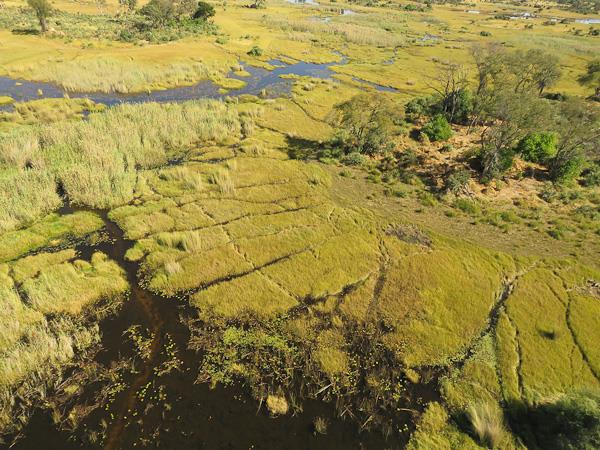
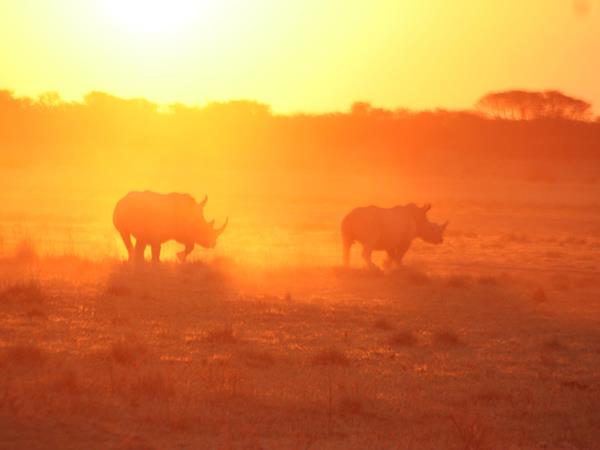
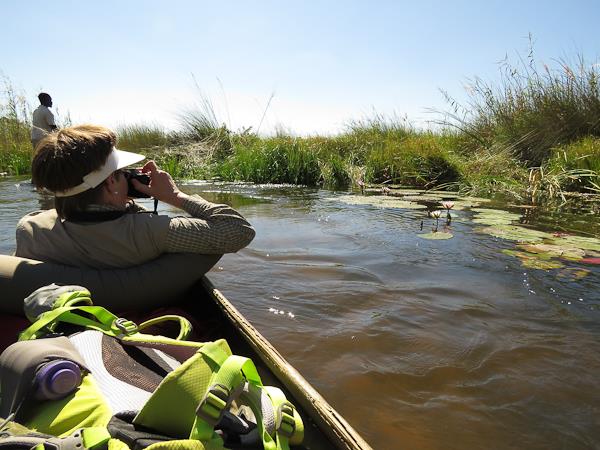
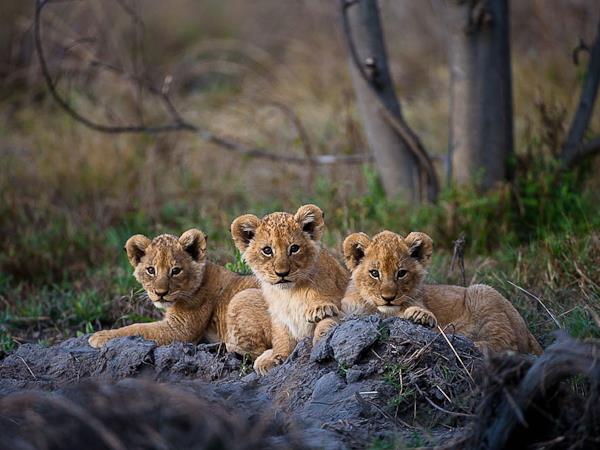
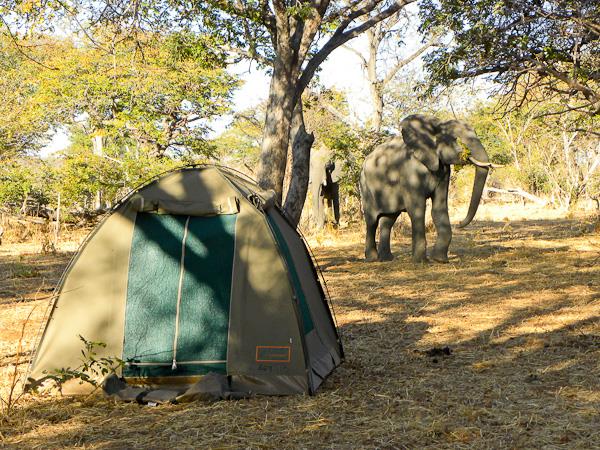
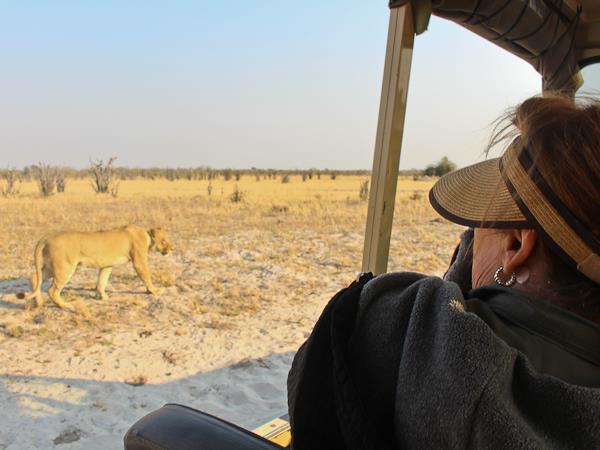
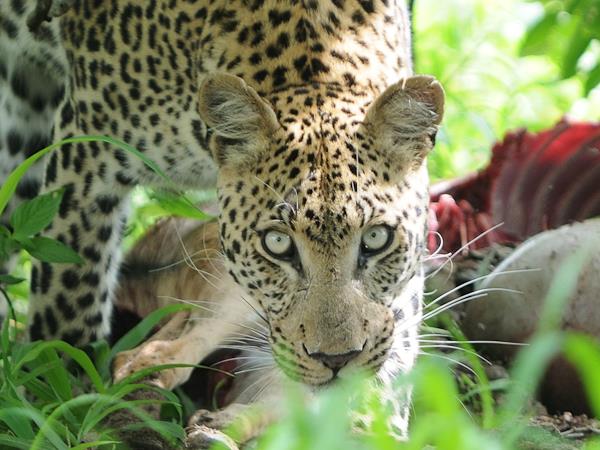
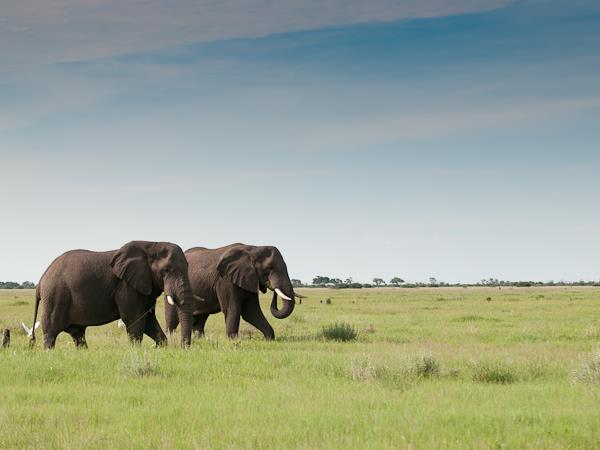
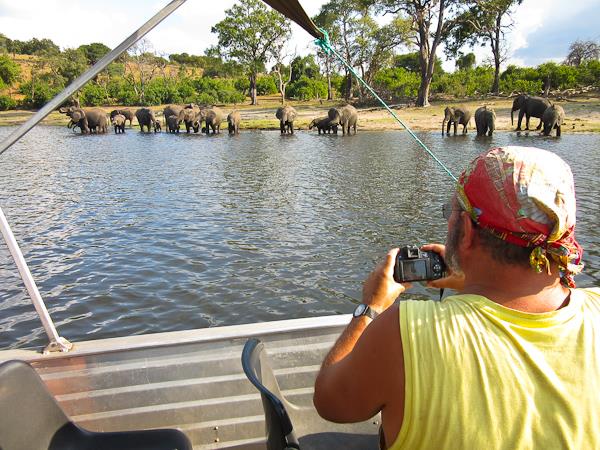
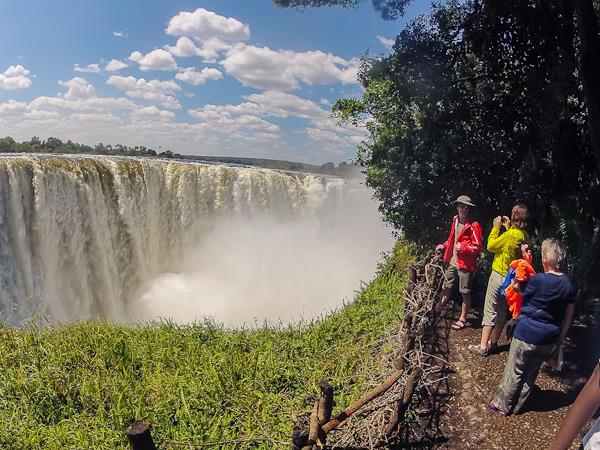
Description of Botswana camping safaris
Botswana is considered Southern Africas premier game viewing destination. The remote wilderness, limited access for visitors and abundant game make for an exceptional wildlife safari. This tour is the essence of why we started running holidays.
For 4 nights on safari we stay at designated campsites in national parks and towns. Formal campsites have hot and cold showers, laundry facilities & telephones. 7 nights we "camp wild" without fences in wilderness areas. On these nights the crew will erect a bucket shower (with hot water off the fire) and a pit latrine (with seat!). 2 nights at a lodge in Livingstone with en-suite rooms and air-conditioning.
All of the 13 breakfasts, 11 lunches and 8 dinners will be provided by the crew, prepared at the vehicle and eaten around the camp fire except the last 2 breakfasts at the lodge in Livingstone.
If youve already experienced a camping safari, Botswana is no different in respects of transport as youll have the advantage of a specially built four-wheel-drive vehicle that comes complete with 12 seats facing forwards and canvas surrounds that can be rolled up to maximise wildlife watching.
For the first couple of days from Johannesburg to the town of Maun youll be travelling in a custom made 12-seater safari truck or an air-conditioned Mercedes 12-seater minibus.
As with most Botswana safari holidays the chance to help out and assist the guide team is certain to increase your experience, with a little help with washing up and baggage loading always appreciated by everyone on the tour.
Also, if there are nine or more travellers, an additional vehicle for supplies and a camping assistant will be included from Day Six to Day 11 to assist with prepping the meals and generally helping out to ensure things run even more smoothly.
From May to September Botswana experiences its dry winter season and youll find a much more generous selection of wildlife watching opportunities mainly due to the lack of vegetation and the reduction of watering holes. This time of year can also get a bit chilly, particularly in the early morning and late at night.
Alternatively, October to April, the Botswana summer, finds a wealth of lush, green foliage as well as a much greater intensity of migrating species of bird. Although game viewing can be a little more restricted its still a good time to visit, especially if you know a few key secret spots.
Itinerary
| Day 1: | JOHANNESBURG to KHAMA RHINO SANCTUARY: Departing Johannesburg at 6:30am we head north into Botswana. We pass Serowe, birthplace of Botswana's first president, Sir Seretse Khama, on our way to the Khama Rhino Sanctuary. This 4300 hectare reserve situated on the Kalahari sandveld, has several natural waterholes and provides prime habitat for white rhino, zebra and wildebeest. We take our first game drive around the open grassland of Malema and Serowe Pans. [camping -LD] |
| Day 2: | MAUN: We drive through the Kalahari to Maun, the gateway to the Okavango Delta. Situated on the banks of the Thamalakane River. Maun is a bustling frontier town where we prepare for the delta excursion. After setting up camp we have a relaxing afternoon at the swimming pool. [camping BL -] |
| Day 3-5: | OKAVANGO DELTA: Our local guides will take us deep into the heart of the Okavango Delta on mekoro (dugout canoes). The delta forms as water from the Angolan highlands pours over the Botswanan flat Kalahari Desert sands creating a delicate, green oasis for birds & wildlife. We will wild camp on remote islands in this amazingly dynamic environment & enjoy bush walks, bird watching & swimming in the clear waters. Camping with our local guides we learn more about their lifestyle & culture. We return to Maun in the late afternoon of day 5 and have time for an optional (own expense) game flight over the Okavango, which will reveal a different aspect of the delta. [camping Bx3, Lx3, Dx2] |
| Day 6-9: | MOREMI & SAVUTI: We have 4 nights in these conservation areas with time to explore the various habitats. We spend our time on game drives watching the plentiful wildlife including wild dog, elephant, hippo, buffalo, lion & other game. Moremi Game Reserve is rated as one of the leading wildlife areas of the world and we take our open 4WD vehicle to Moremi for fantastic game viewing! Grasslands, floodplains, forests, lily lagoons and winding water channels combine to form a variety of game viewing habitats. Moving north over the sand ridge and into the Mababe depression we arrive at the Savuti Marsh. This open grassland area attracts herds of zebra and wildebeest, which in turn draw the large lion prides for which Savuti is famous. We camp wild in the central Chobe National Park at either Savuti or Zwei-Zwei. [camping BLD] |
| Day 10-11: | CHOBE NATIONAL PARK: The Chobe River flows lazily along the northern boundary of the Chobe National Park attracting some of the largest herds of elephant in Africa. In the early morning we search for game on the flood plains of the Chobe River. The late afternoon game viewing "sundowner"cruise is a highlight as we see the mighty elephant herds returning to the Chobe River to quench their thirst. We camp at Kasane on the Chobe River for night 11. [camping Bx2 Lx2 Dx1] |
| Day 12-13: | VICTORIA FALLS / LIVINGSTONE: Overnight for 2 nights in Zambia near Livingstone town on the banks of the Zambezi River. Enjoy a spectacular walk through tropical vegetation to the very edge of the "Mosi oa Tunya"or "the smoke that thunders" - Victoria Falls. Opportunities to white water raft on the mighty Zambezi River, bungi jump, or take a "flight of angels" (own expense) [lodge Bx2 - - ] |
| Day 14: | LIVINGSTONE - TOUR ENDS: Tour ends at 08:00 after breakfast. Transfers to local airports are available [ - B - -] |
Map
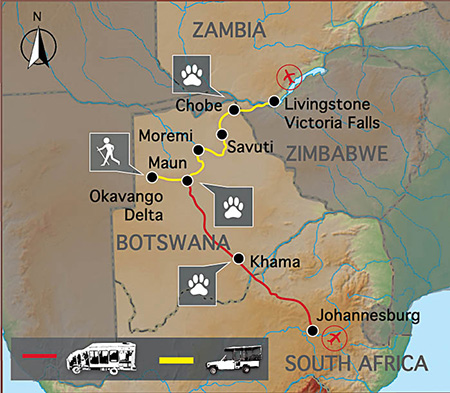
Price information
Check dates, prices & availability
Travel guides
Holiday information
Reviews
31 Reviews of Botswana camping safaris
Reviewed on 11 Aug 2024 by Peter Cyffka
Fantastic! So glad we did this, and that we did it camping, it really was an immersive experience. Read full reviewReviewed on 05 Feb 2024 by Janice Eastman
Being 2 metres from a male Lion calling to its brother - AMAZING Read full reviewReviewed on 05 Feb 2024 by Harriet Ransome-Thompson
Bush camping in the Okavango Delta. Great holiday with great people. Well organised and varied - 5 stars Read full reviewReviewed on 31 Oct 2023 by Caroline Perry
Our guide Brian was absolutely wonderful his contribution and a great group of travellers made it a fantastic trip. Read full reviewReviewed on 06 Aug 2023 by Jennie White
I would give it 10 out of 10 without any hesitation. The guides were all very knowledgeable, helpful, humorous and inclusive, the accommodation was great throughout, the food was really tasty and varied, the wildlife was amazing. We thoroughly enjoyed it all :) Read full reviewReviewed on 11 Jun 2023 by Ann Taylor
Our guides were great, the safari drives incredible. An out of the ordinary holiday which Chris, our guide, always referred to as an adventure. Read full reviewReviewed on 31 May 2023 by Anne Browne
Excellent. Far exceeded my expectations. The guides were superb. So friendly and knowledgable, we knew we were in safe and expert hands. Read full reviewReviewed on 16 Jan 2023 by Rabia Osman
Amazing experience wild camping , Okavango walking Safaris ,saw the big 5 , lots of young animals . Was amazing Read full reviewReviewed on 30 Oct 2022 by Chris Warren
A Leopard walked through the camp 1 night... 11 out of 10! Especially because of the Guides, Brian & Jame and the wizzo cook-Mello. Read full reviewReviewed on 14 Aug 2022 by Louise Siraj
Amazing, incredible and filled with unforgettable experiences... Yes, it is tiring, but it is exhilarating and we shared so much with our fellow travellers that will live with us for ever. Read full reviewReviewed on 10 Jul 2022 by Richard Webb
Outstanding - one of the best holidays we have ever had (or as the guides kept reminding us - "it's not a holiday - it's an adventure"). Read full reviewReviewed on 15 May 2022 by Deb Piranian
Excellent trip. The guides made the difference: a wonderful mix of knowledge, great attention to safety without unduly scaring us, humour, warmth, and friendliness. Read full reviewReviewed on 05 Oct 2019 by Samantha Bennett
The most memorable part of the holiday was having a shower with a few elephants watching us from 200m away was an experience! Read full reviewReviewed on 08 Sep 2019 by Johannah Stretton
It was all wonderful, camping out in the wild , hearing the hippos splashing in the water outside our camp in the Okovango Delta, the wonderful game drives. Read full reviewReviewed on 17 Aug 2019 by Brendan Murphy
Memories are many and varied - Victoria Falls was spectacular. The wildlife - Elephants, Lions, Hippos, Crocodiles and a Leopard to name just a few. Wild camping and the animal noises in the night. The guides (Ali & Jami) were knowledgeable and passionate about Africa. The blood red sunsets are like nothing you have ever seen before. Read full reviewReviewed on 29 Jul 2019 by Michael Thompson
Seeing the animals at very very close quarters, led by very knowledgeable guides was the most memorable part of the trip. Read full reviewReviewed on 20 Jun 2019 by Sara Marques
The most memorable moment was when we spotted a leopard at a distance and we approached it with the vehicle, it was just us and the leopard and all we could hear was cameras shooting and the animal's breath, truly unforgettable! Read full reviewReviewed on 06 May 2019 by Annaοg Soulabaille
All was exciting. The scenic view above Okavango delta, Moremi reserve game, Savuti, Chobe and Victoria Falls. Game Walk (in the delta) and all the Game Drives... Read full reviewReviewed on 21 Dec 2017 by Rosy Everitt
Having stayed in lodges in the past I would say that camping in the wild is by far the best way to safari. Read full reviewReviewed on 15 Aug 2017 by John Watterson
The highlight was probably when elephants strolled into our camp one afternoon! Camping in the wilderness and being up close to elephants, lions, rhino, giraffe, buffalo and hyena, hippos, leopards and fantastic bird life was wonderful. ... Read full reviewReviewed on 17 Aug 2016 by Caitlin Phillips
Wonderful from start to finish. I didn't want it to end. Read full reviewReviewed on 20 Jul 2016 by Pamela Young
Awesome! I would wholeheartedly recommend the wild camping aspect of this trip as an amazing extra dimension to the experience over a lodge or fenced campsite. Read full reviewReviewed on 23 Nov 2016 by Stephen McNally
Going to sleep in my tent, in the heart of the bush knowing that I was surrounded by all the wild life that I had come to see was my most memorable moment... You just can't get this fantastic feeling in a lodge or hotel. A wonderful experience. Well managed and more fun than I would ever have imagined. Read full reviewReviewed on 22 Sep 2016 by Liz Robertson
Excellent - saw more game than we could possibly have hoped for and loved Botswana. Read full reviewReviewed on 02 Oct 2016 by Justin James
Best bits: The Okavango Delta safari and the Chobe safari Read full reviewReviewed on 17 Aug 2015 by Susan Davies
I am really happy we did it and I will never do a holiday as memorable and extraordinary again! Read full reviewReviewed on 11 Nov 2015 by Mark Ereira
Best bits: The wildlife, glimpses of birds and lions, wild camping, professionalism of guides. Read full reviewReviewed on 13 Oct 2014 by Becky Sandford
Indescribably lovely...the most memorable parts were wild camping and interactions with wildlife! Read full reviewResponsible Travel
Planet
Message from co-Founder of this Tour Operator. My name is Bruce and I am a founder of this tour operation. I believe that the old conservation tactic of the setting aside areas of "exclusion" for conservation are outdated.The reality is that in order for effective, sustainable conservation to take place, there needs to be an interest from the society of that country, conscious effort from government and local "buy in" from the local communities. Sadly the world is in a place where economic benefit is the overriding driving force of action and as such conservation is directly linked to economic benefit. Sustainable tourism is therefore absolutely essential for conservation to be effective. Not only for local communities to see value in conservation, but for countries as a whole to place value in protecting their natural heritage.
I believe there is a deep and instinctual link between our humanity and our natural environment. Inherently we all want to know that the wild places are still out there. And Eco-tourism gives us that opportunity, as we so often hear, to "rebalance" or "rejuvenate".
The various promises and commitments detailed below are only a representation of what it is that we do. I sincerely hope that our tours offer our clients an opportunity to experience the wonders of the African continent, and in some small way through focusing itineraries around wildlife and national parks, we contribute to environmental conservation both economically and spiritually.
If you join one of our trips, and have practical feasible suggestions about our responsible travel practices, please contact us. We strive to improve our operation and if we can do more for conservation in Africa, then we're all ears!
Low impact tourism & supporting local communities:
Small group travel: We specialise in small group travel with a maximum group size of 12 clients & minimum of 4. Small groups ensures a small impact on the destinations we visit when compared to larger groups. Smaller groups create an intimate safari experience, and mean that when we interact with local cultures and stay in environmentally sensitive areas, we do not leave a large footprint.
Fuel consumption: By travelling in a small group your carbon foot print is approximately ½ of self drive safari. The average pick-up car hire runs on approximately 12ltr/100km with generally 2 people per vehicle and this equates to approximately 6ltr/100km pp. Our average safari truck runs on 25ltr/100km with an average of 9.5 clients per tour and this equates to 2.6Ltr/100km pp. So, by joining a small group tour, your fuel consumption is less than half of doing a self-drive 4WD or pick up trip.
Cooking: We cook using gas as far as possible and, whenever feasible, avoiding cooking using fire or coal which depletes limited wood resources.
Wooden carving curios: We do take clients to local curio markets to support the local communities. If they want to buy a carving, we encourage clients purchase only small wooden carvings instead of large pieces. This is in an effort to again conserve the forests around the carving markets.
Waste: We ensure that we take all of our rubbish out of wilderness areas and use proper waste disposal facilities on all tours (and in the workshop, including oil traps, oil recycling, cleaning products etc).
Entrance fees: All entrance fees for the national parks in each country are used by the local authorities to maintain the condition and infrastructure of the national parks, and run regular anti-poaching patrols. These are often supplemented by government grants. The national parks support a large number of local community members often providing housing and schooling for the staff families. For us as a tour operator, supporting the various national park boards is an essential element to each tour.
Accommodation: On all tours wherever possible we use locally owned accommodation establishments which are involved in local responsible tourism initiatives. This provides direct benefits to local communities through employment. We avoid large hotel chains and more commercial properties but opt for simple self-catering lodge, B&Bs and tented camps for accommodation in rural areas. By doing this we create an intimate environment for group away from large scale tourism and the communities around the accommodation benefit directly through employment and this creates pride and further interest in sustainable tourism as the communities have tangible benefits from tourism. Our tours focus on out of the way destinations, and as such, our spend is distributed into rural areas.
Drinking Water: Each client, drinking 5 litres per day from 1 litre plastic bottles produces 100 waste plastic bottles on a 3 week safari. On this calculation, we would pollute the environment (and waste energy resources in plastic production) with over 250,000 plastic bottles per year! So as solution, each of our vehicles has a tank of clean drinking water that is filled up along the journey. This is safe tap water. We do not provide bottle water we encourage clients to drink the local clean drinkable tap water wherever possible in order to minimize the amount of plastic bottle waste produced by the purchase of bottled drinking water.
Water conservation: We are acutely aware that in many areas that we visit water is a scarce resource. Clients are encouraged to be conscious of water usage and not to take long showers or waste water.
Wildlife: On all game drives, our trained and qualified guides ensure that our groups interact with wildlife in the appropriate way. Slow movements, no loud noises and to respect the animals personal boundaries. Our philosophy is that we are visitors in the amazing places that we visit, and we do not want our presence to impact the wildlife and environment in any negative way. We also enforce a policy of not feeding any wildlife (animals habituated to human feeding will turn aggressive in the future which often results in authorities being forced to kill that animal) and to appreciate the natural state of the areas that we visit and to leave the area in exactly the same condition that it was when we arrived.
Local guides & communities: On each tour you will travel with two guides for the entire trip. In addition, we also employ local guides for certain activities on tour. These local initiatives help to maintain local cultures and also sustain the ideals of wildlife conservation. Tourism, goodwill and conservation all work together and we aim to maintain the delicate balance at all times! The employment of local guide adds value to our clients visit because they can gain specific local knowledge and expertise from the people who actually live permanently in the area they are visiting. These interactions also give our clients the chance to meet local people and see how tourism is benefiting Africa, piece by piece.
We use local guides at:
Botswana: Okavango Delta, Chobe NP, Ghanzi San Bushman excursion, national parks
South Africa: Mkuzi village walk, Qunu Mandela historical site, Kozi Bay
Swailand: Hlane walking
Lesotho: Malealea Lodge pony trekking guide
Malawi: Boat excursion on Lake Malawi
Mozambique: Dhow excursions
Namibia: Brandberg walk and drives (part of the Tsiseb Community Conservancy), Spizkoppe walk, Gariep River canoeing, Sossusvlei 4WD drivers,
Zambia: Lower Zambezi Canoe excursion, South Luangwa game walks and drives, Vic Falls optional activities
Zimbabwe: Great Zimbabwe Monuments, Matobos NP, Hwange NP, Victoria Falls
For more information on each of the community projects please talk to your guide or contact us.
Underprivileged Children Groups: We operate a number of tours into the national parks of South Africa for underprivileged children from schools based in Johannesburg, South Africa. PEN Organisation is an independent, non-governmental and social development organisation. Its activities focus on neglected and abandoned children and orphans, as well as disadvantaged families. We try to run these tours as often as possible during the course of a year. We believe that the youth are Africas future and that environmental education is important. This opportunity allows them to see for themselves wildlife (perhaps for the first time), nature conservation at work, and also show them employment opportunities that are available in the conservation or tourism industry, and possibly encourage them to follow a career in tourism (for this reason we aim these groups at 14-18 year olds).
Local crafts and produce: At all local markets where fresh produce and crafts are sold and produced, we encourage the clients to barter (gently and in good humour) with the local people. This not only allows the clients to get involved with the local way of life, and interact directly with the local people, but also provides them a platform to experience local life first hand. Having said that, we explain to the clients by bartering too hard for a good deal might seem like a lot of money at the time, but if the amount being haggled over is converted to either US$, Euro or GBP, it amounts to very little. This is the local livelihood and we advise them to keep this in mind at all times.
Wildlife Rehabilitation Centre: We assist a wildlife rehabilitation centre in Springs, Johannesburg. Judy Davidson runs a licensed rehab centre from a small holding. A variety of birds are cared for, from injured barbets, doves, and crows to a brown snake eagle, a Gymnogene, and spotted eagle owls. All birds are treated in a small makeshift clinic, and then kept in aviaries until they have recovered. Once able to fly, or care for themselves again, they are moved to a 'flight' aviary, for a period until they have regained strength. They are then released back into the wild. Those birds which are unable to be released are kept in large aviaries and fed through various donations. We assist the project with donations of practical equipment including shade netting, paint and other items on their wish list.
People
Okavango Delta: We use local community 'polers' to take us into the Okavango Delta. The polers have an intimate knowledge of the Okavango Delta, and their employment as guides ensure that the local community benefit from tourism and ensures that these areas are conserved for future generations.The Okavango Delta, 1000th World Heritage Site, is an important wildlife refuge for many animals, both resident and migratory. It attracts thousands of tourists to Botswana annually, and maintaining the pristine nature of the environment is very important to the country. Water from the Delta is integral to the continued sustainability of the Botswana tourism industry. Without water, the environment would no longer support such diversity. There have been many talks about damming upper sections of the Kavango River which feeds the Okavango Delta. Should this go ahead it will disrupt the natural system of the Delta and adversely affect the wildlife and the industry as a whole. Tour leaders will explain all of this to clients so that clients are made aware of what potentially could happen if this plan is implemented. The more people who are made aware of the threats to this ecosystem, the less likely it is to happen. By people visiting the Delta, creating jobs, and allowing the delta to make much needed funds, the less likely it is that the planned dam will go ahead.
Okavango SOS trees project - Okavango Botswana: For hundreds of years, the local communities in and around Botswana's Okavango Delta have used the wood of the sausage tree to craft their traditional mokoro (dugout canoes). The knowledge and skill have been passed down from generation to generation and, up until recently, has been a sustainable practice. With increasing numbers of people visiting the Delta each year, more mokoro are needed and as a direct result, more and more Sausage Trees (Kigela Africana) are being felled and the tree is sadly disappearing from the region. A traditional wooden mokoro will have to be replaced every five years, thereby placing increased pressure on the dwindling Sausage Tree supply.
As a solution we have established a project to encourage polers in the local communities to buy replica fibreglass mekoros, which have a lifespan of approximately ten years, are more stable and are produced with much less negative affect to the environment. As such, sponsorship for each fibreglass mokoro is needed, and a portion of the tour cost will be donated to the project, but we also will offer our clients the opportunity to contribute to this worthwhile cause. Please feel free to contact the our office for more information on the SOS Trees project or if you would like to make any contributions towards this project. It is something that is close to all of our hearts and we have been successful in replacing 30+ (circ. 2015) mekoro thus far.
Wild Camping in Botswana: As a camping tour this means our environmental impact is minimal. We stay in designated campsites, and leave it in a pristine condition. Litter is strictly policed. The potential of creating wildfires is great, so the group is briefed on smoking restriction and how to dispose of cigarette butts.
All camps are un-fenced, so the potential is there for the wildlife to come into camp and clients are briefed as to the restrictions of keeping to camp and not wandering away from the confines of the campsite.
Khama Rhino Sanctuary: The Khama Rhino Sanctuary (KRS) is a community based project that was established in 1992 to assist is saving the endangered rhino, restore the wildlife area (8585 hectares) and provide economic benefits to the local community through tourism. Rhinos were introduced in the sanctuary as it is being used as a breeding centre for the re-introduction of both black and white rhinos into the national parks of Botswana after the natural population had virtually been hunted to extinction by poaches. Proceeds from visitors to the park help with the rhino breeding programme and go to the local community.
While there have been further reintroduction of rhinos by operators in Botswana by bringing rhino in from South Africa, Khama Rhino Sanctuary is still an integral part of rhino conservation in Southern Africa.
Popular similar holidays
Botswana safari & Vic Falls holiday
From £6050 9 days excluding flights
Delta wildlife-watching, plus thundering waterfall wonders
Botswana wildlife safari
From £3095 - £3645 14 days excluding flights
Explore Botswana on this small group wildlife safari
Botswana fly-in safari holiday
From £3995 7 days excluding flights
Experience Botswana on a 6 night fly-in Safari adventure



















